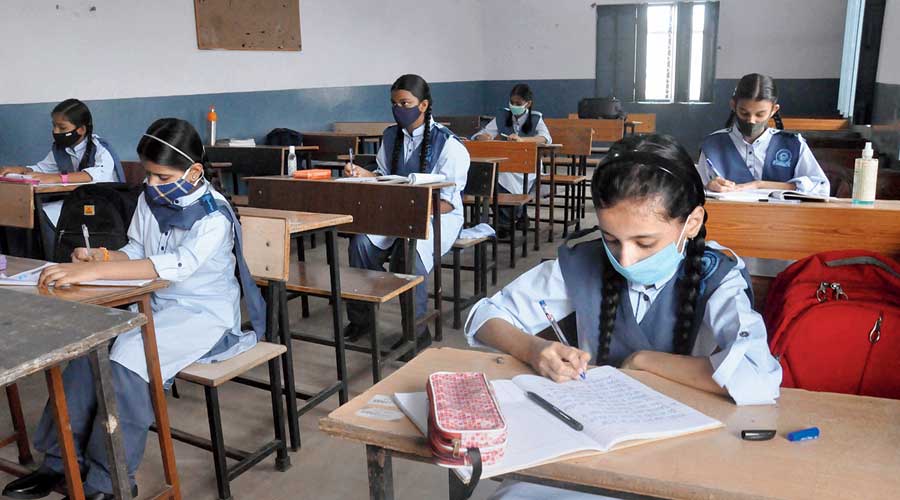The guidelines issued by the state government for the resumption of in-person classes from November 16 say classrooms should be ‘numbered’ with revised seating arrangements for students to maintain distance from each other.
Also, classes are to be held in two sessions to avoid crowding.
The 28-page document, published on Thursday, borrows heavily from the guidelines published in February, when schools had reopened briefly for Classes IX to XII.
The circular states immediate steps have to be taken for cleanliness and the schools have to be made functional by October 31.
Also on Thursday, the Council for the Indian School Certificate Examinations (CISCE) issued two circulars containing instructions for the students who will appear in the ICSE and ISC semester 1 exams.
The semester 1 exams will be held in November and December and the semester 2 exams are scheduled for March and April 2022.
A candidate has to appear in both exams to qualify for the grant of certification for the exams, said Gerry Arathoon, chief executive and secretary of CISCE.
State guidelines
After reopening, awareness should be created among students about the new norms with regards to arrival of students, seating arrangement, social distancing, and hand and respiratory hygiene practices.
Classrooms have to be properly numbered with revised seating arrangements so students can maintain distance from each other.
Classes have to be held in two sessions.
Before class
- Gathering to be avoided at entry and exit
- No guardian or other visitor to be allowed on the campus
- At the time of entry, students have to wash their hands with soap and water. They should be encouraged to wash hands frequently
- Students must be advised not to touch each other's books, bags and tiffin
- Sharing tiffin and drinking water strictly disallowed
- Health and hygiene
- School toilets and all common spaces shall be properly washed daily two hours before opening of schools
- All students must wear masks. Masks should be of appropriate size and preferably each student should keep at least three masks. The right way to wear and take care of masks must be illustrated at guardian meetings
- Students’ body temperature have to be checked preferably before they enter classrooms. Any student suffering from cold or running a temperature shall be sent back home
- Covid-like symptoms have to be reported to the medical officers concerned
- Teachers, non-teaching staff, staff of outside agencies must wear masks
- Schools may consider appointing one or more health and hygiene monitors for each class or section from among the students on a rotation basis
- Group activities like sports and cultural events may be discontinued for the time being
For hostels
- Temporary partition to be erected for separate students. Adequate distance between beds should be maintained
- Alternative space may be arranged to accommodate students to ensure physical distancing
- Initial preference for hostel allotment has to be given to students who have no support at home and no facility to attend online classes
- Every student has to be screened before their stay at hostel
- Only asymptomatic students are allowed to stay at hostels
